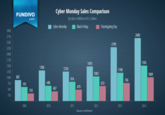Cyber Monday
Part of a series on Black Friday. [View Related Entries]
Overview
Cyber Monday is an annual online-exclusive shopping event observed by both national and smaller online retailers on the Monday after Thanksgiving Day in the United States. Since its emergence in 2005, Cyber Monday has continuously grown into a major international marketing holiday that serves as a popular alternative to Black Friday, the annual in-store shopping event that takes place on the day after Thanksgiving Day.
Background
Cyber Monday was formally introduced as a marketing strategy in 2005 by executives at the digital commerce association Shop.org to offer an extended day of sales event for holiday-season shoppers who missed their opportunities on Black Friday.
Etymology
According to the etymology database Word Spy,[3] the earliest use of the neologism can be attributed to a New York Times[2] article titled "Ready, Aim, Shop" published on November 19th, 2005.
"Because the world needs another Officially Named shopping day, the people who dreamed up Black Friday (the day after Thanksgiving, when retailers hope to turn a profit) have created a nickname for the following Monday. Hence the catchy Cyber Monday, so called because millions of productive Americans, fresh off a weekend at the mall, are expected to return to work and their high-speed Internet connections on Nov. 28 and spend the day buying what they liked in all those stores."
The coinage of the term has been widely credited to Ellen Davis, the-then Senior Vice President of the National Retail Federation, who highlighted "Cyber Monday" as an emerging trend within the retail industry in a Shop.org press release titled "Cyber Monday Quickly Becoming One of the Biggest Online Shopping Days of the Year" published on November 21st that same year.[1]
While traditional retailers will be monitoring store traffic and sales on Black Friday (the day after Thanksgiving), online retailers have set their sights on something different: Cyber Monday, the Monday after Thanksgiving, which is quickly becoming one of the biggest online shopping days of the year.
Notable Developments
2005
On November 21st, 2005, the Chicago Sun-Times[4] published an article reporting that online retailers were embracing Cyber Monday. On November 28th, The Colbert Report featured a comedy segment about the new shopping day. On November 20th, The New York Times[5] reported that consumers were making purchases online in record numbers.
2006
In November 2006, the website CyberMonday[8] was launched to highlight promotions for Cyber Monday sales on various sites online. On November 27th, CNN[9] reported that there was a 50 percent increase in Internet sales on Cyber Monday. On November 29th, ComScore[10] reported that a total of $608 million dollars were spent online.
2007
On November 26th, 2007, the New York Times[12] published an article titled "A Gimmick Becomes a Real Trend," reporting on how online retailers had embraced the shopping event. On December 2nd, ComScore[11] reported that online shopping on Cyber Monday rose 21 percent to $733 million spent.
2008
In 2008, Cyber Monday sales increased by 15 percent to a total of $846 million, according to the ComScore[13] report.
2009
In 2009, Cyber Monday sales increased five percent from the previous year to $887 million, with 52.7 percent of the sales transactions in the United States placed from work computers, according to ComScore.[14]
2010
In 2010, Cyber Monday reached a new milestone in sales with $1.08 billion spent online, an increase of 16 percent from 2009, according to ComScore.[15]
2011
In 2011, Cyber Monday sales continued to increase to $1.25 billion, while the Cyber Week sales accounted for more than $6 billion in the United States from November 28th to December 2nd.
2012
In 2012, Cyber Monday sales saw a 17% increase in sales from the previous year to $1.465 billion,[16] according to ComScore.[17] The report included an infographic illustrating the growth in spending on Cyber Monday.
2013
In 2013, Cyber Monday online sales grew by 18% over the previous year, making it the highest grossing day ever at $2.29 billion in sales, with an average order value of $128.[18]
2014
In 2014, Cyber Monday was the busiest shopping day of the year with sales exceeding $2 billion in desktop online spending, with an average planned expenditure of $361 per person, according to ComScore.[19]
2015
[researching]
Impact
International Participation
Cyber Monday has subsequently been embraced by online retailers across the globe, including Canada, the United Kingdom, Germany, France, Portugal, New Zealand, Germany, Chile, Colombia, Ireland, Australia, India and Japan.
Derivatives
Green Monday
Green Monday is a retail industry term coined by the online marketplace eBay and used by other major retailers to describe their best sales day during the annual holiday shopping season in December, usually the second Monday of December.
Giving Tuesday
Giving Tuesday is an annual charity event launched and organized by New York City's 92nd Street Y community center in partnership with the United Nations Foundation in 2012 as a way to promote charitable donations during the first week of December immediately following the observation of Black Friday and Cyber Monday.
Search Interest
External References
[1] PRNewsWire (via Wayback Machine) – Cyber Monday Quickly Becoming One of the Biggest Online Shopping Days of the Year
[2] New York Times – Ready Aim Shop
[3] Word Spy – Cyber Monday
[4] High Beam – Cyber Monday gaining ground (page unavailable)
[5] New York Times – Online Sales take Off on Cyber Monday (registration needed)
[6] Business Week – Cyber Monday Marketing Myth
[8] Wayback Machine – Cyber Monday
[9] CNN – For etailers its Cyber Monday
[10] ComScore – Cyber Monday E Commerce Spending Beats Forecast
[11] ComScore – Cyber Monday Spending Propels Holiday E Commerce
[12] New York Times – A Gimmick Becomes a Real Trend (registration needed)
[13] ComScore – E Commerce Spending Jumps 15 Percent
[14] ComScore – Cyber Monday Online Sales Up 5 Percent
[15] ComScore – Cyber Monday E Commerce Sales
[16] ComScore – Cyber Monday Spending Hits 1-25 Billion
[17] ComScore – Cyber Monday by the Numbers
[18] ComScore – Cyber Monday Jumps 18 Percent to $1.735 Billion in Desktop Sales to Rank as Heaviest U.S. Online Spending Day in History
[19] ComScore – Cyber Monday statistics and trends for 2014
[20] ComScore – Expectations and Predictions – Cyber Monday 2015
[21] CNN – Cyber Monday deals are here
[22] The Verge – The 15 best deals of Cyber Monday 2016
[23] Forbes – Cyber Monday Set To Be Largest Shopping Day In History













